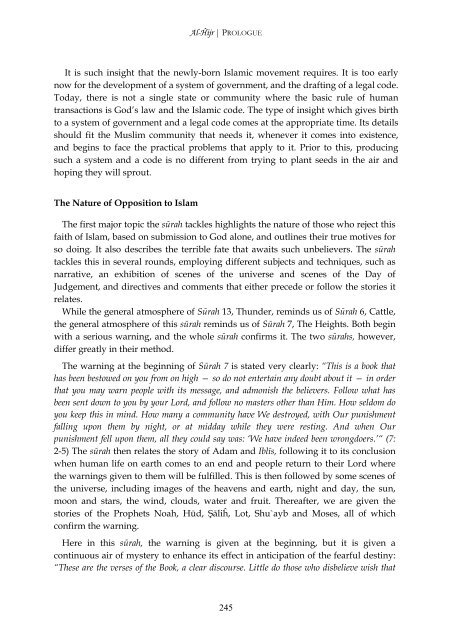Volume 10 Surah 12 - 15 - Enjoy Islam
Volume 10 Surah 12 - 15 - Enjoy Islam
Volume 10 Surah 12 - 15 - Enjoy Islam
Create successful ePaper yourself
Turn your PDF publications into a flip-book with our unique Google optimized e-Paper software.
Al-Ĥijr | PROLOGUE<br />
It is such insight that the newly-born <strong>Islam</strong>ic movement requires. It is too early<br />
now for the development of a system of government, and the drafting of a legal code.<br />
Today, there is not a single state or community where the basic rule of human<br />
transactions is God’s law and the <strong>Islam</strong>ic code. The type of insight which gives birth<br />
to a system of government and a legal code comes at the appropriate time. Its details<br />
should fit the Muslim community that needs it, whenever it comes into existence,<br />
and begins to face the practical problems that apply to it. Prior to this, producing<br />
such a system and a code is no different from trying to plant seeds in the air and<br />
hoping they will sprout.<br />
The Nature of Opposition to <strong>Islam</strong><br />
The first major topic the sūrah tackles highlights the nature of those who reject this<br />
faith of <strong>Islam</strong>, based on submission to God alone, and outlines their true motives for<br />
so doing. It also describes the terrible fate that awaits such unbelievers. The sūrah<br />
tackles this in several rounds, employing different subjects and techniques, such as<br />
narrative, an exhibition of scenes of the universe and scenes of the Day of<br />
Judgement, and directives and comments that either precede or follow the stories it<br />
relates.<br />
While the general atmosphere of Sūrah 13, Thunder, reminds us of Sūrah 6, Cattle,<br />
the general atmosphere of this sūrah reminds us of Sūrah 7, The Heights. Both begin<br />
with a serious warning, and the whole sūrah confirms it. The two sūrahs, however,<br />
differ greatly in their method.<br />
The warning at the beginning of Sūrah 7 is stated very clearly: “This is a book that<br />
has been bestowed on you from on high — so do not entertain any doubt about it — in order<br />
that you may warn people with its message, and admonish the believers. Follow what has<br />
been sent down to you by your Lord, and follow no masters other than Him. How seldom do<br />
you keep this in mind. How many a community have We destroyed, with Our punishment<br />
falling upon them by night, or at midday while they were resting. And when Our<br />
punishment fell upon them, all they could say was: ‘We have indeed been wrongdoers.’“ (7:<br />
2-5) The sūrah then relates the story of Adam and Iblīs, following it to its conclusion<br />
when human life on earth comes to an end and people return to their Lord where<br />
the warnings given to them will be fulfilled. This is then followed by some scenes of<br />
the universe, including images of the heavens and earth, night and day, the sun,<br />
moon and stars, the wind, clouds, water and fruit. Thereafter, we are given the<br />
stories of the Prophets Noah, Hūd, Şāliĥ, Lot, Shu`ayb and Moses, all of which<br />
confirm the warning.<br />
Here in this sūrah, the warning is given at the beginning, but it is given a<br />
continuous air of mystery to enhance its effect in anticipation of the fearful destiny:<br />
“These are the verses of the Book, a clear discourse. Little do those who disbelieve wish that<br />
245

















